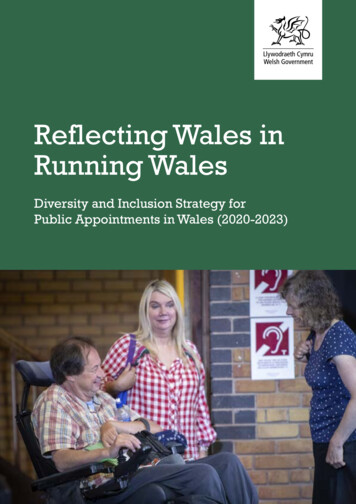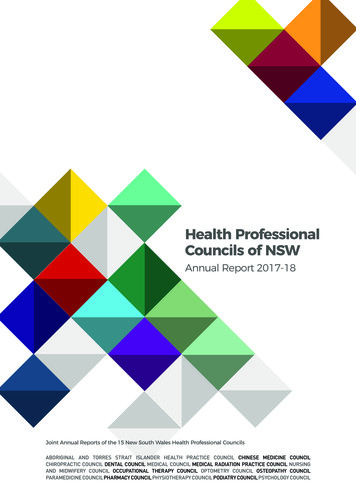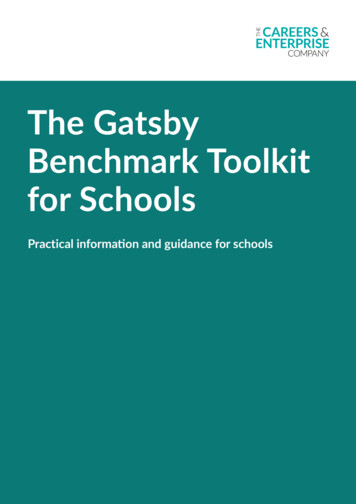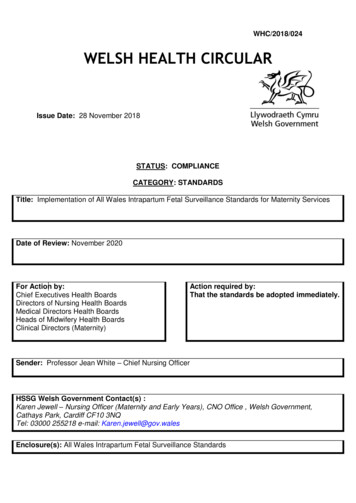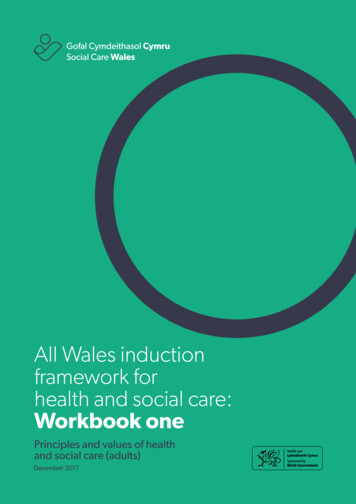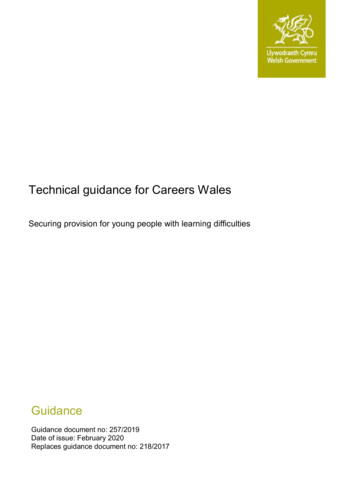
Transcription
Technical guidance for Careers WalesSecuring provision for young people with learning difficultiesGuidanceGuidance document no: 257/2019Date of issue: February 2020Replaces guidance document no: 218/2017
Technical guidance for Careers WalesAudienceThis document is principally aimed at Careers Wales.Other parties who may have an interest includeprincipals of institutions in the further education sectorin Wales, heads of specialist further educationestablishments, young people, parents/carers, localauthorities, social services departments and localhealth boards.OverviewThis document sets out advice and guidance on theWelsh Government’s expectations for the role ofCareers Wales in the assessment process undersection 140 of the Learning and Skills Act 2000 and insecuring provision for young people with learningdifficulties at specialist further educationestablishments.Action requiredCareers Wales are required to have regard to theadvice and guidance set out within this document.Further information Enquiries about this document should be directed to:Additional Learning Needs BranchSupport for Learners DivisionThe Education DirectorateWelsh GovernmentCathays ParkCardiffCF10 3NQe-mail: Post16ALN@gov.wales@WG EducationFacebook/EducationWalesAdditional copiesThis document can be accessed from the WelshGovernment’s website at Related documents Securing provision for young people with learningdifficulties at specialist further educationestablishments (2020)Technical Guidance for Specialist Further EducationEstablishment (2020)Mae’r ddogfen yma hefyd ar gael yn Gymraeg.This document is also available in Welsh. Crown copyright 2017 Digital ISBN 978-1-78964-600-9 WG36827
ContentsIntroductionStatutory contextRole of careers advisersTransition into further educationConsentProducing an assessment reportProducing an application for fundingSection 140 assessment: learning and skills planMainstream further education provision formSpecialist further education provision breakdown formRequest for/update to section 140 assessment formApplication for funding a place at a specialist further education establishment2457911223438414546
Introduction1. The purpose of this document is to set out, for the benefit of careers advisers withinCareers Wales, advice and guidance on the Welsh Government’s expectations for theassessment process under section 140 of the Learning and Skills Act 2000. Thisincludes the role of careers advisers in respect of securing provision for young peoplewith learning difficulties (see ‘statutory context’ section on page 4, for a definition) atspecialist further education (FE) establishments. This document has been developed inconsultation between the Welsh Government and Careers Wales.2. Guidance on producing an assessment report under section 140 of the Learning andSkills Act 2000 (“the 2000 Act”) has previously been developed for careers advisers.This document replaces and expands on that original guidance.3. The policy and process by which the Welsh Government will make decisions aboutfunding placements for young people, aged 16-25, with learning difficulties, whorequire access to specialist provision is set out in the policy guidance ‘securingprovision for young people with learning difficulties at specialist further educationestablishments’1. However, this technical guidance document provides further detailedinformation on how careers advisers will fulfil their role and responsibility in line withthat policy and in particular the policy and process by which Welsh Government willmake decisions about undertaking a section 140 assessment.4. This document is not intended as an ‘absolute’ guide to the assessment of a youngperson’s needs nor does it set out the rigid requirements which must be met. TheWelsh Government expects that careers advisers will act in a flexible and responsibleway to identify the education and training needs of a young person with learningdifficulties and establish the provision considered as necessary to meet those identifiedneeds. Where specialist provision is being requested it is important that appropriateinformation is provided to the Welsh Government in order for an informed decision tobe made. Where it is considered that certain pieces of information or the manner inwhich they are conveyed are important to the efficient and timely decision-makingprocess, this guidance highlights this by using must or it is essential. Where it is notpossible for careers advisers to provide these pieces of information the WelshGovernment will seek to act in a flexible way.5. Following this guidance will assist the Welsh Government to ensure that assessmentsare compliant with section 140 of the Learning and Skills Act 2000.6. The Welsh Government invited the National Assembly for Wales to replace the existinglaw relating to post-16 education for young people with learning difficulties withlegislation aimed at supporting young people with additional learning needs. TheAdditional Learning Needs and Education Tribunal (Wales) Bill was passed by theNational Assembly for Wales on 12 December 2016 and subsequently became an er-education2
on 24 January 2018 following Royal Assent. The roll out of the Act2 is expected tocommence from September 2021. However, until this change takes place the currentlaw remains in force. This document does not include any information regarding therole of careers advisers within any future legislative system, nor does it identifytransition arrangements leading to that system.The Additional Learning Needs and Education Tribunal (Wales) Act 2018, includes a provision to transferresponsibility to secure specialist provision from the Welsh Government to local authorities. Should thisprovision be enacted it will replace the processes set out in this document in their entirety because the roleof Careers Wales in securing specialist provision will cease.23
Statutory context7. A person will be considered to have a learning difficulty if that person:(a) has a significantly greater difficulty in learning than the majority of persons of theirage, or(b) has a disability which either prevents or hinders them from making use of facilitiesof a kind generally provided by institutions providing post-16 education or training (seesection 41(5) of the 2000 Act).8. A person is not to be taken to have a learning difficulty solely because the language (orform of language) in which they are or will be taught is different from a language (orform of language) which has at any time been spoken in their home3.9. The Welsh Government’s functions in respect of securing the provision of facilities foreducation and training and for funding placements, including those at specialist FEestablishments, are set out in the 2000 Act, the key provisions of which aresummarised in the Annex.10. In brief, the Welsh Government is obliged to secure the provision of a range of facilitiesfor education and training for young people aged 16 to 25 and they have powers tofund FE establishments and young people. When exercising these functions the WelshGovernment must have regard to the needs of persons with learning difficulties and inparticular, to any report of an assessment the Welsh Government arranges undersection 140. Those assessments must be arranged for young people who havestatements of special educational needs (SEN) and who are leaving school to go intofurther education, and they can also be arranged for young people in othercircumstances.11. If the Welsh Government cannot secure the provision of the right range of facilities foreducation and training for young people with learning difficulties unless they alsosecure the provision of boarding accommodation, then they must also secure theprovision of boarding accommodation.Summary of effect12. Taken together, one of the practical effects of sections 31, 32, 41 and 140 of the 2000Act is to require the Welsh Government to consider whether they should fund theplacement of a young person with learning difficulties at a specialist FE establishment.3Learning and Skills Act 2000, section 41(6).4
Role of careers advisers13. Careers advisers undertake section 140 assessments on behalf of the WelshGovernment. This usually forms part of the transition process during the last year ofcompulsory schooling for the young person (see ‘Transition into Further Education’section on page 7).14. Careers advisers should be mindful of the legislative framework within which theyoperate, acting on behalf of Welsh Government, in respect to conducting the section140 assessment. It is the role of the careers adviser to provide advice and support inrespect to identifying and understanding the post-16 education and training provisionavailable to the individual.15. It is the responsibility of careers advisers, in undertaking the section 140 assessment,to produce an assessment report for the young person. Careers advisers should makeevery reasonable effort to source the available evidence that will enable them toidentify the education and training needs of the young person and establish thenecessary provision required to meet those needs. In addition, where provision at aspecialist FE establishment has been identified, the careers adviser is responsible forsubmitting an application for funding to the Welsh Government to secure that specialistprovision.16. The careers adviser also has an important role in communicating with the youngperson and their parent/carer. It is vital that the careers adviser keeps the youngperson and parent/carer involved in the assessment process and kept informed ofprogress, especially where an application has been submitted to the WelshGovernment to secure specialist provision. Where the careers adviser needs toapproach the Welsh Government for specific advice, it is expected the careers adviserwill relay that advice to the parent/carer and continue engaging further with them.17. For those young people receiving compulsory education, careers advisers will beexpected to engage within the transition review process, commencing from Year 9.However in doing so, careers advisers should not get drawn into discussions regardingthe quality of provision or the appropriateness of a placement within the youngperson’s school. Whilst the young person is in school, they and the special educationprovision they receive are the responsibility of the school and the local authority.Where these concerns exist the young person or parent/carer should be directed tocontact the appropriate person.18. Where the young person currently has a statement of special educational needs, thecareers adviser must be clear that the young person is in their last year of schoolingbefore commencing a section 140 assessment, i.e. it is the intention of the localauthority for the statement of SEN to cease at the end of that academic year. Where ayoung person is considering leaving their school early or the school are recommendingthat the young person leaves school early, the young person with a statement of SENcontinues to be the responsibility of the local authority until that statement is ceased. Itis the responsibility of the local authority to cease the statement, not the school.Consideration of further education, be it within a mainstream or specialist FEestablishment, should not be considered an alternative choice whilst the young personremains statemented.5
19. The careers adviser must also be clear on their role for those young people who arealready accessing post-16 provision. Where the further provision being sought by theyoung person or parent/carer which is not related to the education and training needsof the young person, it is for the relevant agency, i.e. social services, to take over leadresponsibility for that individual. In these circumstances the careers adviser shoulddirect the young person or parent/carer to the relevant agency.20. The role of the careers advisers in the section 140 assessment process is set out infurther detail in this document. The Welsh Government expects careers advisers to actwith independence, to objectively consider the available evidence base and form aconclusion based on their professional judgement.21. In those circumstances where the professional judgement of the careers adviser is atodds with the views of the young person or parent/carer, the careers adviser should actin accordance with the guidance set out in this document.6
Transition into further education22. Transition from school to a new learning establishment can be a difficult time for anyyoung person. Those with learning difficulties are at a particular risk of not making asuccessful transition, if appropriate planning and sufficient time have not been put inplace. This can potentially impact on their ability to progress with learning and/orachieve their intended outcomes.23. Clear identification of a young person’s education and training needs and the provisionestablished as necessary to meet those needs, will help a young person to make asuccessful transition into the FE sector.24. The transition planning process is set out in the Special Educational Needs Code ofPractice for Wales4 and begins in Year 9. The SEN Code of Practice for Waleshighlights the importance of multi-agency input early in the SEN transition process inorder that relevant multi-disciplinary assessments and care plans, which may includethe provision of further education facilities, are conducted and can contribute to theformation of a young person’s Transition Plan.25. Chapter 9 of the SEN Code of Practice for Wales sets out the process for transitionfrom school and describes the roles of agencies involved. The transition planningand/or annual review process must be undertaken in an impartial, unbiased, personcentred way. These meeting(s) for that young person should therefore only involvethose as identified within the SEN Code of Practice. The Welsh Government would notnormally expect specialist FE establishments to be actively involved in review meetingsas it would be difficult to maintain impartiality when discussing appropriate andavailable options for that young person.26. Where the assessment is being conducted in relation to a young person with astatement of SEN, it should form part of the transition planning process relating to suchstatements and is in effect the culmination of that process. It is expected, young peoplewho have statements of SEN at their existing schools will already be in contact with acareers adviser through the annual review of the SEN statement.27. Where a local authority (LA) transition protocol exists the careers adviser should seekto be included. If a careers adviser is purposefully excluded then they should informthe Welsh Government.28. The Welsh Government expects all FE establishments to be open to requests fromcareers advisers to assess whether they are able to meet the particular needs of ayoung person. If careers advisers are encountering difficulties from any FEestablishments to participate in the assessment process, they should inform the WelshGovernment.The SEN Code of Practice for Wales is issued pursuant to section 313 of the Education Act 1996. LAs andGoverning Bodies exercising functions under Part IV of the Education Act (‘Special Educational Needs’)have a legal duty to have regard to the provisions of the Code.47
29. The mainstream FE establishment’s view on the extent to which it can meet a youngperson’s needs is an important part of the assessment process. It is therefore essentialthat mainstream FE establishments engage early in the transition planning processand the subsequent section 140 assessment process. Where possible, it is consideredgood practice for mainstream FE establishments to develop positive relationships withtheir feeder schools in order to share information on provision available within theirsetting and to identify early the particular needs of school pupils. It is also consideredgood practice for mainstream and specialist FE establishments to engage with eachother regarding those young people with complex needs who are seeking post-16education, to ensure the necessary provision to meet these identified education andtraining needs can be established and realistically delivered.30. In establishing provision, a visit by the young person to the mainstream FEestablishment is not always necessary for a setting to make a determination onwhether they are able to meet a young person’s needs. Where a young person hassignificantly complex and holistic needs the careers adviser should discuss with themainstream FE establishment about whether the young person has to visit or if adetermination, that they clearly could not meet the young person’s needs, could bemade based on a detailed description of the young person’s needs.8
Consent31. During the assessment process decisions will need to be made about the careerchoices for the young person. It is important that a young person is involved andunderstands those decisions being made about them. Where possible it should be theyoung person who is making a decision about their future. The fact that a youngperson has a learning difficulty should not prevent the young person being part of adecision making process or be assumed they are unable to make a decision forthemselves.32. In addition to the young person making decisions about any potential career choices,the careers adviser will need to gain the agreement of the young person, verbally or inwritten form, to share any information relating to the assessment (early in theassessment process) or to share the final assessment outcome with relevant agencies,in line with compliance set under General Data Protection Regulations (GDPR) andData Protection 2018. Where the young person is under the age of 16 the parent’sconsent should be sought to share this information.33. Whether it is part of an assessment or the funding application process, careersadvisers will need to understand whether the young person concerned has the mentalcapacity to consent to the provision identified. This must be identified by the careersadviser during the assessment process. Where there are concerns in relation to ayoung person’s mental capacity it is for the relevant LA social services department tolead on the mental capacity assessment for that young person. Should the careersadviser encounter any difficulties in obtaining a mental capacity assessment throughthe relevant LA social services department then they should contact the WelshGovernment as early in the process as possible for advice.34. Where the young person has been assessed by an appropriate authority as lacking thecapacity to contribute meaningfully to the assessment process, the careers advisermust comply with the requirements of the Mental Capacity Act 20055 and the MentalCapacity Code of Practice6.35. Where consent relates to a placement at a specialist FE establishment, the WelshGovernment needs to know whether a valid consent, in relation to their mental capacityis in place and the associated details. This is to ensure that the young person’s bestinterests and human rights are being appropriately safeguarded, and in order to decidewhether, and on what terms, to agree funding for placements at specialistestablishments, or how to deal with the funding application. In some cases forexample, an application to the courts might be needed to authorise the placement.Until such time consent is agreed, Welsh Government will not consider an applicationfor a specialist placement36. Cases in which a placement might amount to a deprivation of liberty are particularlycomplex. The mechanisms available to authorise placements in these cases vary,depending on the nature of the establishment at which the placement is intended to ntal-capacity-act-code-of-practice9
made. For this reason it may take longer to deal with a funding application for aplacement in cases where these issues have not been resolved before the fundingapplication is submitted.37. Where a mental capacity decision has been made on behalf of the young person for aplacement at a specialist FE establishment a copy of the relevant documentation (seeparagraph 97(j)) must be provided, where relevant, to the Welsh Government alongwith the application for funding. The Welsh Government cannot proceed to consider aplacement where information about a young person’s mental capacity is not provided.10
Producing an assessment report38. In certain circumstances, a young person’s education and training needs may beassessed under section 140 of the Learning and Skills Act 2000. A section 140assessment is an assessment resulting in a written report, known as the Learning andSkills Plan (LSP), of a young person’s identified post-16 education and training needsand the provision established as necessary to meet them.When must the Welsh Government arrange for an assessment?39. Under section 140(2) of the Learning and Skills Act, the Welsh Government mustarrange for an assessment of a young person during their last year of compulsoryschooling where the following two conditions are met:a. a LA in Wales maintains a statement of special education needs for that person;andb. the young person will leave school at the end of their last year of compulsoryschooling to receive post-16 education or training or higher education.When may the Welsh Government arrange for an assessment?40. In certain circumstances it is in the Welsh Government’s discretion to prepare anassessment.41. Under section 140(3), the Welsh Government may arrange for an assessment inrespect of a young person who:a. is in their last year of compulsory schooling or is over compulsory school agebut is not yet age 25; andb. who appears to have a learning difficulty; andc. who is receiving or is likely to receive post-16 education or training or highereducation.42. In the following circumstances the Welsh Government have pre-determined that it isappropriate for an assessment to be carried out under section 140(3) for a youngperson who:a. is aged over compulsory school age but under 25; andb. has a statement of SEN maintained by a LA in Wales (so is in Year 12, 13 or14); andc. will leave school at the end of the academic year he is currently in, to receivepost-16 education or training or higher education.43. In some circumstances the Welsh Government may determine that it is appropriate fora young person to be assessed under section 140(3). These may include the following,but this is not an exhaustive list:a. a young person who: has a learning difficulty but is without an SEN statement (for example youngpeople supported through School Action / School Action Plus); and is in their last year of compulsory schooling; and is believed likely to need additional support as part of their future educationor training; and11
would benefit from an assessment to identify their learning needs and theprovision required to meet those needs.b. or a young person who: has a learning difficulty but is without a statement of SEN (for exampleyoung people supported through School Action / School Action Plus); and is over compulsory school age but under 25 who is receiving or is likely toreceive post 16 education or training or higher education; and is currently in, or about to start, post 16 education or training, but has notpreviously received an assessment and whose circumstances are such thatan assessment of their learning needs and the provision required to meetthem is appropriate (e.g. a young person who has acquired a learningdifficulty, perhaps as a result of an accident); or has previously received an assessment but whose circumstances have sincechanged (e.g. a young person with a deteriorating condition) to such anextent that a further assessment is necessary to ensure their learning needsare met; or was previously covered by a statement of SEN, but did not get anassessment, because he/she did not move from school into other educationor training. This might apply should a young person undertake employmentfor a year before wanting to return to education or training.Who will be assessed and when must the assessment be undertaken?44. The careers adviser must undertake an assessment of any young person they haveidentified as meeting the criteria outlined in paragraph 39 and 42. Careers advisers,will also automatically provide an assessment where the following criteria are met:45. The young person is –a. supported under School Action or School Action Plus; andb. has been subject to annual and/or transition review processes consistent 7 with ayoung person with a statement of SEN.46. Careers advisers, or someone else able to advocate on behalf of the young personmay approach the Welsh Government on behalf of the individual or their parent/carerto request that an assessment is undertaken if the criteria outlined in paragraph 41, 42or 43 applies. In such circumstances, it will be for the Welsh Government to determinewhether an assessment is required. Where an assessment is required, the careersadviser will undertake such an assessment only with the Welsh Government’s priorwritten consent. In these circumstances, the careers adviser, or whoever else may beadvocating on behalf of the young person, should contact the Welsh Government viathe mailbox: post16aln@gov.wales.47. Where arrangements for an assessment have been made, that assessment should becompleted as soon as reasonably possible in order to assist the young person toconsider their options for further learning and to ensure that appropriate support can be7By ‘consistent’ it is envisaged that the annual and/or transition review for a young person supported by‘school action’ or ‘school action plus’ involves multi-disciplinary input, in a similar way that a review of astatement of SEN involves multi-professional input.12
arranged. It is expected that section 140 assessments will be completed by the end ofthe spring academic term for those young people expecting to commence post-16education and training at the start of the next academic year, i.e. the followingSeptember.48. As identified under paragraphs 39 and 42 an assessment must be undertaken for ayoung person who is seeking to leave school to enter higher education (HE). Thisapplies to those young people in their last year of compulsory schooling or in their lastacademic year of their school sixth form, who are seeking to go directly into HE.49. Where a young person with an existing LSP is seeking to move from further educationto higher education, there is no requirement to update/amend the existing LSP. Theexisting LSP should be shared with the HEI, provided the young person is inagreement. This will allow the HEI to better understand the young person’s previoussupport needs.Requirements of the Assessment50. Section 140 requires that an assessment should result in an LSP which identifies thefollowing:a. the young person’s educational and training needs; andb. the reasonable and realistic provision and duration required to meet thoseneeds, along with any additional holistic support required, where it is needed;51. Furthermore, the LSP should specifically include:a. summarised evidence based information gathered during the transition processthat specifically relates to and identifies the young person’s education andtraining needs; andb. the specific FE establishment or Work Based Learning (WBL) provider that willdeliver the provision established as necessary, including confirmation that thenecessary provision is both available and has been reserved on a provisionalbasis; andc. consideration of prior education and training achievements; andd. reasons why a specific FE establishment has been chosen as being able tomeet the young person’s needs; ande. reasons why a young person’s capability requires a particular duration8 fordelivering the provision considered as necessary; andf. the young person’s desired outcomes linked to their future aspirations, such asemployment or semi-independent/independent living and how the identifiedprovision will equip the young person to achieve these outcomes; andg. where required, the views of the young person and/or parent/carer if theydisagree with the established provision considered necessary to meet theidentified education and training needs.52. The LSP should identify what can actually and realistically be provided, not what isideal or what would be good in theory. The careers adviser needs to be satisfied that8Meaning the duration in totality, i.e. where it is expected the young person will need to access more thanone course over more than one year.13
the stipulated provision is reasonable, realistic and, based on the individual’scapability, can actually be achieved by the young person. The careers adviser shouldreach that judgment at the time of concluding its assessment and in writing the LSP.53. The LSP needs to make a recommendation about the placement, including thenecessary course/programme of study and duration. The content and level of detail inthe LSP will depend on the circumstances of the individual case, but the LSP shouldreasonably reflect in sufficiently clear and intelligible form the principal importantconclusions of the assessment based on the professional judgement of the careersadviser. This needs to be based on the range of evidence available pertaining to thatyoung person. The report should also reference the specific evidence from which thecareers adviser has used to come to a judgement.54. There is a specific LSP form on page 34, which has been prepared in consultationbetween the Welsh Government and Careers Wales for the assessment in order toensure consi
young person or parent/carer which is not related to the education and training needs of the young person, it is for the relevant agency, i.e. social services, to take over lead responsibility for that individual. In these circumstances the careers adviser should direct the young person or parent/carer to the relevant agency. 20.

